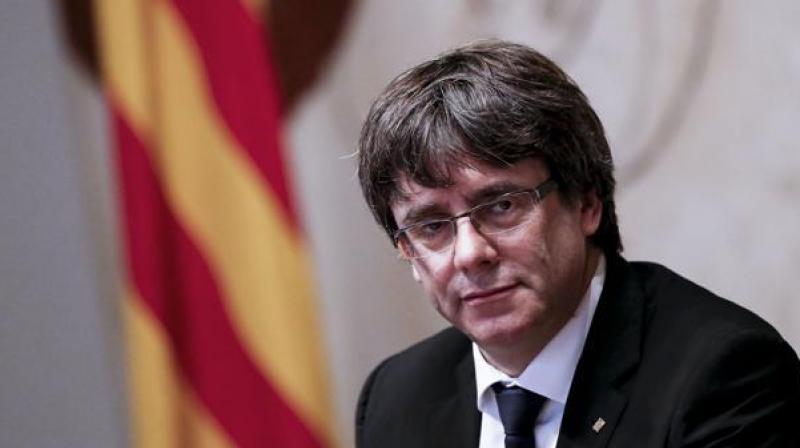Catalan ex-president Carles Puigdemont, 4 others in custody in Brussels
The Belgian judge will have to decide within 24 hours what comes next for the five separatist politicians wanted in Spain.

Brussels: The Brussels prosecutors said Sunday that ousted Catalan president Carles Puigdemont and four ex-regional ministers were taken into custody to start the process of their possible extradition to Spain.
The five presented themselves to federal police at around 9 a.m. (0800 GMT; 3 a.m. EST), Brussels prosecutor's office spokesman Gilles Dejemeppe said. He said that they haven't been arrested and that Puigdemont and the four members of his disbanded Cabinet will be heard by an investigative judge later in the day.
The Belgian judge will have to decide within 24 hours what comes next for the five separatist politicians wanted in Spain on suspicion of rebellion for pushing through a declaration of independence for the northeastern Catalonia in violation of Spain's Constitution.
Dejemeppe said the judge's options range from "refusal to execute the European arrest, arresting the people involved, releasing them on conditions or under bail." He said if they are arrested then they will be sent to jail as the extradition process continues. Dejemeppe said that the entire process from arrest to extradition, could take more than 60 days.
That delay could give Puigdemont time to participate, albeit from afar and in largely a symbolic capacity, in the snap regional election called by Spain's government for Catalonia on Dec. 21.
A senior official of Puigdemont's party, the center-right Democratic Party of Catalonia, said on Sunday that the party wanted Puigdemont to repeat as its candidate. Spanish government spokesman Inigo Mendez de Vigo has said that any politician can run in the election unless he or she has been convicted of a crime.
Puigdemont and the four ex-ministers fled to Belgium this past week after being removed from power by Spanish authorities as part of an extraordinary crackdown to quash the region's illegal secession claim.
A Spanish National Court judge issued warrants for the five absconded lawmakers on suspicion of five crimes, including rebellion, sedition and embezzlement, on Friday, a day after the same judge sent another eight former Catalan Cabinet members to jail without bail while her investigation continues. A ninth spent a night in jail and was freed after posting bail.
Puigdemont wrote in Dutch in his Twitter account on Saturday that he was "prepared to fully cooperate with Belgian justice following the European arrest warrant issued by Spain."
Puigdemont's lawyer in Brussels had previously said that his client plans to fight extradition to Spain without requesting political asylum.
Political forces in Catalonia are hurriedly jockeying for position to start a campaign that promises to be as bitter as it is decisive to Spain's worst institutional crisis in nearly four decades.
While pro-union parties try to rally support to win back control of the regional parliament in Barcelona, pro-secession parties are debating whether or not to form one grand coalition for the upcoming ballot.
Parties have until Tuesday to register as coalitions or they must run separately.
Catalan ex-regional president Artur Mas, the first leader to harness the political momentum for secession, told Catalan public television on Sunday that he backed a fusion of parties for the December vote. But, he said, the main goals must be to recover the self-rule of the region and the release of the jailed separatists, not another immediate attempt to culminate the independence drive.
"Under these exceptional circumstances that our country is going through, don't we have to substitute the normal and logical competition for the cooperation we all need?" Mas said. "If we add the issue of independence, we won't get as many people to support us."
An opinion poll published by Barcelona's La Vanguardia newspaper Sunday forecasts a tight electoral race between parties for and against Catalonia ending century-old ties with the rest of Spain.
The poll predicts that pro-secession parties would win between 66-69 seats. They won 72 two years ago. Sixty-eight seats are needed for a majority.
Catalonia's Parliament defied Spanish authorities and voted in favor of a declaration of independence on Oct. 27. The next day, Spain's central government used extraordinary constitutional powers to fire Catalonia's government, take charge of its administrations, dissolve its regional parliament and call a regional election.
Despite fears that there would be massive resistance to the intervention, the takeover by Spanish authorities has gone smoothly.
Spain's Constitution says the nation is "indivisible" and that all matters of national sovereignty pertain to the country's parliament.
In all, Spanish prosecutors are investigating 20 regional politicians for rebellion and other crimes that could be punishable by up to 30 years in prison.
Another two leaders of pro-secession grassroots groups are also in jail while an investigation continues into suspicion of sedition.
Hundreds of pro-secession Catalans gathered in town squares across the region Sunday to put up posters in support of independence and to demand the release of the jailed separatists.
"People came today because we want to send a message to Europe that even if our president is still in Brussels and all our government now is in Madrid jailed, that the independence movement still didn't finish and people are still striving to get independence in a peaceful and democratic way," said 24-year-old protester Adria Ballester in Barcelona.
The grassroots group Catalan National Assembly has also called for a strike on Wednesday and a public protest on Saturday.
Fueled by questions of cultural identity and economic malaise, secessionist sentiment has skyrocketed to reach roughly half of the 7.5 million residents of Catalonia, a prosperous region that is proud of its Catalan language spoken along with Spanish.
Puigdemont and his fellow separatists claim that an illegal referendum on secession held on Oct. 1 that polled 43 percent of the electorate and failed to meet international standards gives them a mandate for independence.

